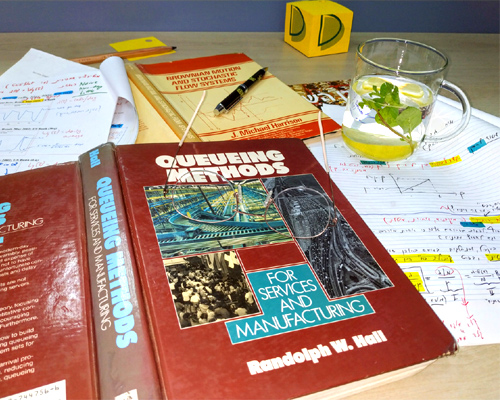 The subject of this course are Service Networks, specifically their Science, Engineering and Management. Service networks are models of telephone and Internet services, or banks and insurance, hospitals, airports, supermarkets, some transportation systems, and even more. (Course applications will emphasize telephone-based services.) Our main theoretical framework for the course is Queueing Theory. However, the subject matter is highly multi-disciplinary, hence alternative frameworks (Statistics, Psychology, Marketing) will be useful as well.
The subject of this course are Service Networks, specifically their Science, Engineering and Management. Service networks are models of telephone and Internet services, or banks and insurance, hospitals, airports, supermarkets, some transportation systems, and even more. (Course applications will emphasize telephone-based services.) Our main theoretical framework for the course is Queueing Theory. However, the subject matter is highly multi-disciplinary, hence alternative frameworks (Statistics, Psychology, Marketing) will be useful as well.
The theory is at the level of an undergraduate course in Stochastic Processes. Home assignments will be theoretical, empirical and practical.
Empirical analysis will involve real data from a call center that serves one of the Israeli banks. Further data resources are from the Technion SEE Center (SEE = Service Enterprise Engineering).
Practical analysis will be based on two tools: SEEStat and 4CallCenters. The first tool, developed at the SEECenter, provides an online graphic-based interface with transactional data (call centers, hospitals); the second tool supports workforce management (staffing).
For more details, see Service Engineering of Service Networks.
The final grade will be based on home assignments and a final exam. Home assignments MUST be prepared by groups of exactly two students, no less, no more. (Few homework assignments might in fact be individual.)
The only prerequisite for the course is an elementary course on Stochastic Processes, covering Markov Chains (discrete and continuous time) and Poisson Processes. An example for such a course is 094314 in IE&M. Similar courses from EE and Math. are appropriate as well.
Graduate students who wish to take the course but do not meet this prerequisite should contact the instructor.
More information about the course and its assignments is available, upon request, from Avishai Mandelbaum.
A tour of the tool in 4CallCenters is strongly recommended. It supports advanced and user friendly analysis of the models Erlang-C (M/M/N), Erlang-A (M/M/N with abandonment), and more.